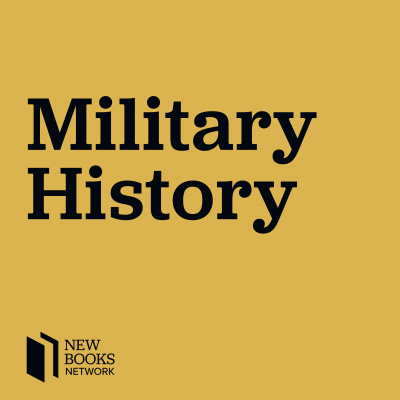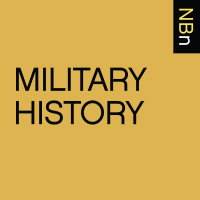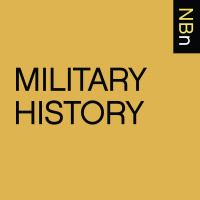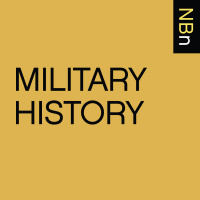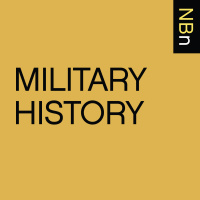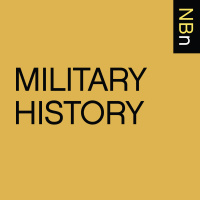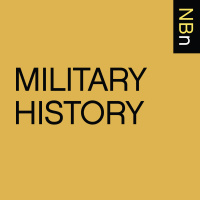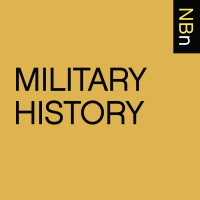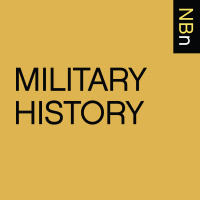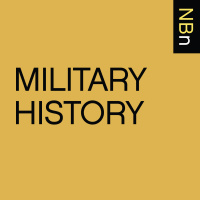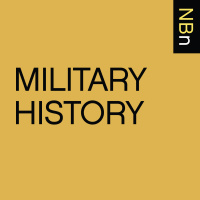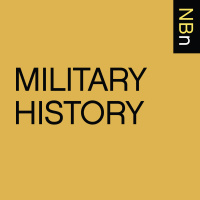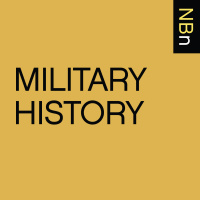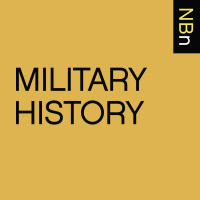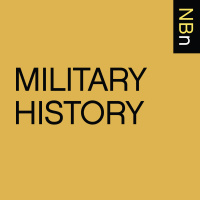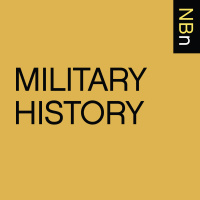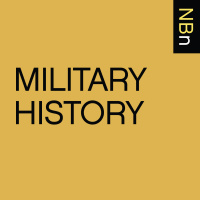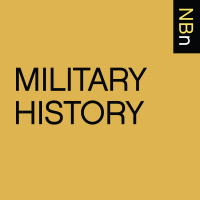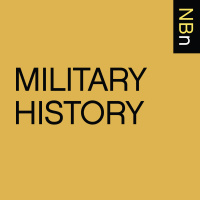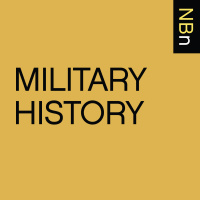Sinopsis
Interviews with Scholars of Military History about their New Books
Episodios
-
Nick Dybek, “The Verdun Affair: A Novel” (Scribner, 2018)
14/08/2018 Duración: 45minIn a break with protocol, I decided to interview a novelist rather than a military historian. Nick Dybek, a creative writing professor at Oregon State University has written a terrific novel, The Verdun Affair: A Novel (Scribner, 2018). It’s protagonist is Tom, an American living in France after World War I, having served as an ambulance driver for the American Field Service. He has the macabre task of gathering bones from the battlefield at Verdun, in preparation for the construction of ossuary there. Families come from all over France, looking for news, or perhaps the remains, of loved ones reported missing or dead during the war. One such pilgrim is Sarah, also American, looking for her husband, Lee, whom she is convinced still lives. You can learn more about the story in the interview (or go read the book!), which also details some of the remarkable historical research that Dybek conducted as he wrote. The sense of global catastrophe, the losses of grieving families, the search for meaning, the effo
-
John M. Curatola, “Bigger Bombs for a Brighter Tomorrow: The Strategic Air Command and American War Plans at the Dawn of the Atomic Age, 1945-1950” (McFarland, 2016)
01/08/2018 Duración: 51minConventional wisdom has long held the position that between 1945 and 1949, not only did the United States enjoy a monopoly on atomic weapons, but that it was prepared to use them if necessary against an increasingly hostile Soviet Union. This was not exactly the case, our guest John M. Curatola argues in his book, Bigger Bombs for a Brighter Tomorrow: The Strategic Air Command and American War Plans at the Dawn of the Atomic Age, 1945-1950 (McFarland & Company, 2016). Curatola is a professor of history at the United States Army Command and General Staff College at Fort Leavenworth, Kansas. He presents the story of an ad hoc, frequently chaotic, strategic defense posture at the opening of the Cold War. Inter-service rivalries, inter-agency bickering, and deficiencies in equipment, morale, and training all left the United States Air Force and the Atomic Energy Commission to pursue their own strategic plans, which Curatola notes were unrealistic, and in some cases, almost ludicrous.Learn more about your
-
William D. Godsey, “The Sinews of Habsburg Power: Lower Austria in a Fiscal-Military State, 1650-1820” (Oxford UP, 2018)
17/07/2018 Duración: 53minDuring the 17th and 18th centuries, Austria established itself as one of the dominant powers of Europe, despite possessing much more limited fiscal resources when compared to its counterparts. In The Sinews of Habsburg Power: Lower Austria in a Fiscal-Military State, 1650-1820 (Oxford University Press, 2018), William D. Godsey uses the financial support provided by one region of the Habsburg’s empire to understand how it maintained its status during a time of change in the nature of military power. As Godsey explains, the challenge was posed by the contrasting trends of a need for a larger standing army and the ability of the region’s economy to support it. In response to the demands placed on it, the Estates of the region – the assemblage of clerical, noble, and municipal leaders who implemented taxes for the monarchy – evolved to play a regular role in supplying the Habsburg armies with the resources it needed to operate. This evolution preserved the importance of the role the Estates played in the exercise
-
Guy Laron, “The Six-Day War: The Breaking of the Middle East” (Yale UP, 2017)
16/07/2018 Duración: 55minThe title of Guy Laron’s The Six-Day War: The Breaking of the Middle East (Yale University Press, 2017) says it all. As Laron notes in this interview, the fact that the war led to ongoing conflicts in the Middle East is an accepted interpretation of the war’s meaning. However, through his research Laron has provided a new lens by which to understand the war. Using a holistic perspective that situates the war in the context of the Cold War and the economic development of the non-western world, Laron argues that several broader trends pushed the Israeli and Arab states into conflict in 1967. As developmental aid disappeared, Arab and Israeli governments alike were facing crises of confidence from their own populations. Reliance on the military became a way to earn legitimacy with a public that was becoming disenchanted, though it also fed into a number of increasingly belligerent moves that ultimately led to war on June 5, 1967. Laron’s research shows as well the role of the superpowers in this conflict. As dev
-
Marc Ambinder, “The Brink: President Reagan and the Nuclear War Scare of 1983” (Simon & Schuster, 2018)
11/07/2018 Duración: 57minThe Brink: President Reagan and the Nuclear War Scare of 1983 (Simon & Schuster, 2018), by Marc Ambinder, is a history of US-Soviet Relations under Ronald Reagan and an exploration of nuclear command and control operations. Ambender weaves together accounts of military exercises, false alarms, and espionage to tell the story of how close the U.S. and the former Soviet Union came to nuclear war in 1983. The Brink is a narrative-style book that also details the evolution of U.S. nuclear war decision-making practices, continuity of government planning, and U.S. interactions with NATO and allies in during the 1980s. Beth Windisch is a national security practitioner. You can tweet her @bethwindisch.Learn more about your ad choices. Visit megaphone.fm/adchoices
-
Steve R. Dunn, “Bayly’s War: The Battle for the Western Approaches in the First World War” (Naval Institute Press, 2018)
09/07/2018 Duración: 39minThough Great Britain’s warships ruled the waves throughout the First World War, their greatest challenge came from just underneath them. Nowhere was this better demonstrated in the Western Approaches, where, as Steve R. Dunn details in his book Bayly’s War: The Battle for the Western Approaches in the First World War (Naval Institute Press, 2018), the Royal Navy found themselves hard pressed even to secure the trade routes just off their western shores from the threat posed by Germany U-boats. At the start of the war, the command covering the region, the Coast of Ireland station, was something of a backwater, one not anticipated to be a major area of the war. The U-boat campaign against British trade soon changed this, as sinkings such as those of the liner Lusitania demonstrated the vulnerability of shipping in the region. In response the Admiralty nominated the dynamic Lewis Bayly to take over as commander. Setting a focused, no-nonsense tone from the start, Bayly soon moved to protect merchant shipping and
-
Craig Symonds, “World War II at Sea: A Global History” (Oxford UP, 2018)
06/07/2018 Duración: 55minThough there are numerous books about the naval history of the Second World War, very few of them attempt to cover the span of the conflict within the confines of a single volume. Craig Symonds undertakes this challenge in his book World War II at Sea: A Global History (Oxford University Press, 2018), which provides him with a perspective that produces a new understanding into how the conflict was waged. Symonds demonstrates that the naval campaigns were pivotal in determining the winners of the war, given the vast mobilization of resources undertaken by many of the combatants. For the Germans, disrupting this was key, and the fall of France dramatically changed the balance of the naval war in Europe. Yet the British and the Americans were hard pressed to focus on the German threat to British trade once Japan attacked their Asian colonies in an effort to expand their own empire. The result was a juggling act, as the western Allies were forced to constantly readjust finite naval resources to wage two maritime
-
Joy Rohde, “Armed with Expertise: The Militarization of American Social Research During the Cold War” (Cornell UP, 2013)
27/06/2018 Duración: 49minIn Armed with Expertise: The Militarization of American Social Research During the Cold War (Cornell University Press, 2013), Joy Rohde discusses the relationship between the social sciences, academia, and national security institutions. Through an examination of the use of military research during the Cold War, Dr. Rohde raises questions about the ethics of scholarship, the military industrial complex, and the role of expertise in the national security arena. This book is a thought provoking read on the implications of military-funded social science. Beth Windisch is a national security practitioner. You can tweet her @bethwindischLearn more about your ad choices. Visit megaphone.fm/adchoices
-
Andrew J. Huebner, “Love and Death in the Great War” (Oxford UP, 2018)
26/06/2018 Duración: 01h17minCoincident with the hundredth anniversary of the first American engagements in the First World War, Andrew J. Huebner joins New Books in Military History to talk about his book, Love and Death in the Great War (Oxford University Press, 2018). Through a collection of vignettes – some quite personal to him – Huebner considers the First World War through the lens of the average American citizen soldier and his family. Accordingly he describes how Americans genuinely believed they were taking part in a war to keep their families and futures safe from German aggression. Following a course largely set by propaganda, Americans personalized and romanticized the war far more than historians have thought in the past. Rather than being an agent for change, Huebner also presents the war as a call to normalcy, one which would reassert white Anglo-Saxon masculine prerogatives in a society that, under the Progressives, had for many become unmoored from its past.Learn more about your ad choices. Visit megaphone.fm/adchoi
-
Lisa M. Todd, “Sexual Treason in Germany during the First World War” (Palgrave Macmillan, 2017)
22/06/2018 Duración: 01h02minThe First World War is usually associated with Trench Warfare, industrial mobilization, and the Lost Generation. In her recent book, Sexual Treason in Germany during the First World War (Palgrave Macmillan, 2017), Lisa M. Todd reveals an obsession among elites, the state, and everyday people with sex in the midst of such disruptive warfare. She argues that the state, the churches, and even their neighbors viewed men and women who had sex outside of marriage as traitors to the nation. Critically exploring explosive debates among moral Christians, sex reformers, military figures, and politicians, this book demonstrates the profound ambiguities of the era. Balancing everyday stories with major legal changes and cultural discourse, Todd assesses sexual encounters on the western, eastern, and home fronts. She analyzes fraught issues such as sex work, POW labor, and the spread of sexually transmitted diseases. Combining dynamic individual stories from a rich archival base, this book is one that will appeal to many
-
Jacob N. Shapiro, “Small Wars, Big Data: The Information Revolution in Modern Conflict” (Princeton UP, 2018)
07/06/2018 Duración: 55minSmall Wars, Big Data: The Information Revolution in Modern Conflict (Princeton University Press, 2018), Eli Berman, Joseph H. Felter, and Jacob N. Shapiro, takes a data-based approach to examine how actions can affect violence in asymmetric conflicts. Using data sets from Afghanistan, Iraq, and the Philippines, the authors evaluate several variables, including the role of civilians, mobile communications, and foreign aid projects. The book is data-rich and accessible, with findings presented at a tactical level and a policy level. Beth Windisch is a national security practitioner. You can tweet her @bethwindisch.Learn more about your ad choices. Visit megaphone.fm/adchoices
-
Janet E. Croon, “The War Outside My Window: The Civil War Diary of LeRoy Wiley Gresham, 1860-1865” (Savas Beatie, 2018)
31/05/2018 Duración: 01h01minSit alongside a disabled teenage Southerner as he records his experience in The War Outside My Window: The Civil War Diary of LeRoy Wiley Gresham, 1860-1865 (Savas Beatie, 2018). This unique document—rare for its teenager’s perspective, rare for its register of daily pain across five years—is a testament to what it means to watch the world of the Confederacy slowly fall as one’s body fails, too. LeRoy Gresham, from Macon, Georgia, began writing his diary at twelve years old. His leg had been smashed by falling rubble from a chimney of a burned-out house that he and friends were exploring. LeRoy writes daily, most often from a reclined position and with a mind full of good humor and acid wit. Snark lurks quietly in his words. He covers the goings on of his home, family, slaves, and the people who pass through town and his house, as well as what he reads in newspapers and in a never-ending stream of novels. The war proceeds with fits and starts, and he adds his cheers for the Confederacy, until, finally, the dr
-
Jonathan Boff, “Haig’s Enemy: Crown Prince Rupprecht and Germany’s War on the Western Front” (Oxford UP, 2018)
28/05/2018 Duración: 01h03minThere has been historiographical revolution in the literature of the war on the Western Front in the past thirty years. In Haig’s Enemy: Crown Prince Rupprecht and Germany’s War on the Western Front (Oxford University Press, 2018), Jonathan Boff, Senior Lecturer in History and War Studies at the University of Birmingham, brings that revolution further along by presenting to an anglophone audience the figure of Crown Prince Rupprecht of Bavaria. Rupprecht, who was for the entirety of the war the British army’s most consistent military opponent on the Western Front, is presented in a new light by Boff. Using primary source materials that have rarely if ever been used previously, Boff shows to the reader how the war from its beginning in August 1914 to the German defeat in November 1918, appeared to Rupprecht himself. Along the way, Boff deals with some of the unresolved issues that historians are still dealing with as per the war on the Western Front, such as ‘was the Battle of the Somme a Bri
-
Simeon Man, “Soldiering through Empire: Race and the Making of the Decolonizing Pacific” (U California Press, 2018)
25/05/2018 Duración: 45minSimeon Man‘s book Soldiering through Empire: Race and the Making of the Decolonizing Pacific (University of California Press, 2018) focuses on the role of Asians who worked within the making of U.S. global power after 1945. Man argues that the Cold War divide between communism and liberal democracy cast Asians into either bad or good—the bad being the Communists and Viet Cong, and the good being military servicemen channeled into American war zones. Following the labor circuits of Asian military workers and soldiers as they navigated an emergent Pacific world, Man reframes Asians as both U.S. citizens and as people from Asian countries like the Philippines, South Korea, and Taiwan. Doing so, Man writes, allows us to understand how U.S. empire took hold through a murky process of decolonization that on its surface sought to create an “Asia for Asians” but actually legitimated and obscured U.S. state violence. At the same time, Man traces other forms of decolonization by Asian soldiers who sought freedom
-
Tarak Barkawi, “Soldiers of Empire: Indian and British Armies in World War II” (Cambridge UP, 2017)
25/05/2018 Duración: 38minTarak Barkawi, a Reader in International Relations at the London School of Economics, has written an important book that will cause many of us to rethink the way we understand the relationships between armies and societies. In Soldiers of Empire: Indian and British Armies in World War II (Cambridge University Press, 2017), Barkawi argues that many scholars of Western armies tend to overstate the degree to which motivation and fighting spirit as well as the urge to commit atrocity derive from the characteristics, strengths or weaknesses of the societies the solders come from. Studying the British Indian Army in Burma during World War II, Barkawi sees instead the way that ritual, drill, and constructed traditions that are more internal to the army itself do more to explain how that army fought so relatively effectively. The Indian peasants who filled the ranks of the British Army shared little socially, politically or otherwise with the United States Marines who fought the Japanese on Guadalcanal. And yet they
-
James Wright, “Enduring Vietnam: An American Generation and its War” (Thomas Dunne Books, 2017)
17/05/2018 Duración: 50minThere’s been something of a revival of interest in the Vietnam War in the past years. Perhaps it’s the influence of Ken Burns’ documentary miniseries, perhaps it’s just the distance from the wars in Iraq and Afghanistan. For whatever reason, 2016, 2017 and 2018 saw the publication of a number of new works about the war. In Enduring Vietnam: An American Generation and its War (Thomas Dunne Books, 2017) James Wright employs a generational framework to understand the experience of the war. He offers a careful and persuasive synthesis of the political and diplomatic history of the war. But Wright’s interest really lies in the experience of the ordinary men and women who fought in the war or who saw it from afar. Surveys of the experience of fighting in Vietnam are interspersed with fascinating discussions of responses in the US. His pairing of a discussion of Memorial Day, 1969 as experienced across the US with the fighting at Hamburger Hill is particularly engrossing. My fathe
-
Jessica Elkind, “Aid Under Fire: Nation Building and the Vietnam War” (U Kentucky Press, 2016)
09/05/2018 Duración: 57minAs any scholar of the Vietnam War can tell you, the field doesn’t lack for study: it’s one of the most-studied fields for both military and diplomatic historians. And yet, for all of the scholarly attention it has received, there are understudied facets of this complicated, multilateral conflict, particularly in its early years, before American ground troops entered the country in large numbers. Jessica Elkind’s Aid Under Fire: Nation Building and the Vietnam War (University of Kentucky Press, 2016) does precisely this by examining U.S. development programs that tried to foster a viable South Vietnamese state in the 1950s and early 1960s. The outcomes of those disparate programs ultimately deepened a U.S. commitment to the Republic of South Vietnam and helped set the United States on the road to war. Dr. Elkind’s research was conducted using U.S. government sources, private collections from Michigan State University, and South Vietnamese government sources held in Ho Chi Minh City. Michigan State University w
-
Steven L. Ossad, “Omar Nelson Bradley: America’s GI General, 1893-1981” (University of Missouri Press, 2017)
04/05/2018 Duración: 01h13minSteven L. Ossad joins New Books at Military History to talk about his award-winning biography, Omar Nelson Bradley: America’s GI General, 1893-1981 (University of Missouri Press, 2017). Following the suggestion of his mentor, Martin Blumenson, Steven delivers a comprehensive look at the life and career of this central, but little-studied, figure in the Allied effort toward victory in the European Theater of Operations in World War Two. Rising up from abject poverty to become the last of the American “five stars” – those general officers esteemed enough to be awarded the rank General of the Army – Bradley stands out not only on the balance of his wartime service, but his critical stewardship of the Veterans Administration and later his service as the nation’s chief military advisor to President Harry S. Truman. Steven Ossad delivers a highly anticipated, “warts and all”, look at this important man and his legacy.Learn more about your ad choices. Visit megaphone.fm/adchoices
-
Harlan Ullman, “Anatomy of Failure: Why America Loses Every War It Starts” (Naval Institute Press, 2017)
02/05/2018 Duración: 01h08minSince 1945, the United States has lost every war it started. Why? A Vietnam War veteran, Tufts University Ph. D. and intimate of many of the leading figures in the American national security apparatus in the past forty-years, Dr. Harlan Ullman‘s new book endeavors to find the answers to this most disturbing of queries. An in depth examination of American strategic and military decision-making since the Eisenhower era, Dr. Ullman shows the reader the flawed policy processes and decisions which made debacles such as Vietnam War, the Second Gulf War and the ongoing war in Afghanistan all too predictable. According to Dr. Ullman one answer to his query is simply that almost all presidents and administrations since 1960 have consistently failed to use sound strategic thinking and lacked sufficient knowledge or understanding of the circumstances prior to deciding whether or not to employ force. From John F. Kennedy to Donald Trump, from Vietnam to the war against ISIS, Anatomy of Failure: Why America Loses Ev
-
Aidan Forth, “Barbed-Wire Imperialism: Britain’s Empire of Camps, 1876-1903” (U California Press, 2017)
24/04/2018 Duración: 01h07minIn his new book, Barbed-Wire Imperialism: Britain’s Empire of Camps, 1876-1903 (University of California Press, 2017), Aidan Forth employs a comparative and trans-imperial approach to map a global network of camps established by Britain in the late nineteenth and early twentieth centuries. Between 1876 and 1903, officials set up famine, plague, and wartime concentration camps across India and South Africa in response to a number of interconnected global emergencies. Situating these imperial camps within a longer tradition of Victorian reforms, Forth argues that, while the camps ostensibly provided care and relief for millions of inmates, they simultaneously functioned as sites of social control and confinement. In this way, Barbed-Wire Imperialism challenges existing understandings of British concentration camps, recasting them not as exceptional wartime measures, but as ubiquitous tools of imperial governance. Aidan Forth is an Assistant Professor of History at Loyola University Chicago, where he teaches cou
